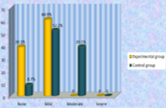Abstract
A quasi-experimental research study (posttest only research design) was conducted to evaluate the effect of ginger tea on chemotherapy-induced nausea and vomiting among cancer patients in selected hospitals of Bhubaneswar and to find out the association of level of chemotherapy-induced nausea and vomiting with selected socio-demographic variables. For this study, a quantitative experimental approach and post-test only research design was adopted. 100 patients were selected by convenience sampling technique and categorized into experimental (n=50) and control group (n=50) for this study. Self- structured socio-demographic proforma and self- structured record analysis proforma was used to collect socio-demographic data and modified nausea and vomiting scale was used to measure the level of chemotherapy-induced nausea and vomiting among cancer patients. The data was analyzed by using SPSS version 20.0 (Statistical Package for the Social Science). The post-testt level of chemotherapy-induced nausea and vomiting among experimental and control groups was compared by unpaired‘t’ test and the result showed (p=<0.0001) significant difference between both groups. The chi-square analysis shows a statistically significance association between chemotherapy-induced nausea and vomiting and the emetogenic potential of the drug in both groups and in control group age was also significance associated. The ANOVA test revealed the statistically significance of the posttest level of chemotherapy-induced nausea and vomiting within groups of the emetogenic potential of a drug. The present study concluded that the food component, like ginger tea, is an effective home remedy for the reduction of chemotherapy-induced nausea and vomiting among cancer patients.
Full text article
Authors

This work is licensed under a Creative Commons Attribution-NonCommercial-NoDerivatives 4.0 International License.

